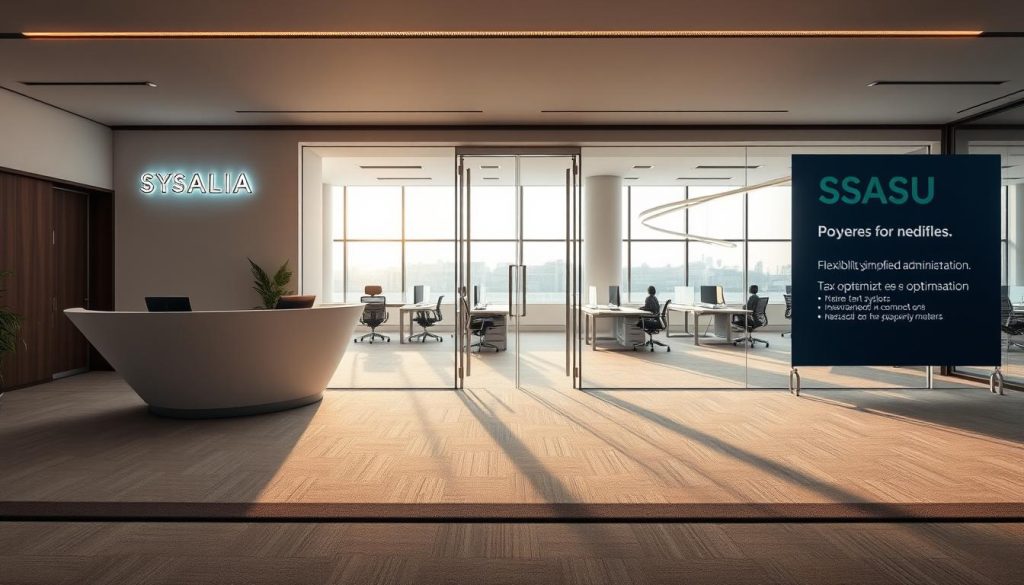Going independent is an exciting step, but it comes with important decisions. Many professionals assume « freelance » is a legal status—but it’s not. Instead, it describes how you work, not the legal framework protecting your entreprise.
In France, self-employed individuals choose from several statut juridique options. Each impacts taxes, liability, and social security. Whether you opt for a micro-enterprise, EURL, or SASU, the right structure balances flexibility and security.
Hybrid models like portage salarial also exist. They blend freelance freedom with employee benefits. Your choice depends on revenue goals, risk tolerance, and long-term plans.
Table of Contents
Key Takeaways
- « Freelance » refers to a work style, not a legal business status.
- France offers multiple structures, including micro-enterprises and SASUs.
- The right status affects taxes, liability, and social security coverage.
- Hybrid options like portage salarial provide added stability.
- Consider revenue, legal protection, and growth when choosing.
What Does Les Statuts de Freelance Mean in France?
Navigating France’s freelance landscape requires understanding key legal distinctions. Your statut juridique defines everything from taxes to asset protection. Unlike employees, freelancers operate under commercial law—a fundamental difference.
The Legal Definition of Freelance Status
French law categorizes independent professionals under business statutes. Your entreprise individuelle or company structure determines:
- Tax registration: Freelancers pay via URSSAF; employees have payroll deductions.
- Liability: Sole proprietors face unlimited responsibility. Structures like EURL/SASU offer responsabilité limitée.
- Social security: Freelancers join the TNS regime; employees access the general system.
Freelance vs. Salaried Employment
Salaried workers enjoy labor code protections—fixed hours, paid leave, and unemployment benefits. Freelancers trade stability for flexibility:
« 72% of French freelancers start as micro-enterprises due to simplified taxes. But growth often requires upgrading to an EURL or SASU. »
Real-world examples:
- A graphic designer using portage salarial gains employee benefits while freelancing.
- An IT consultant with high revenue opts for SASU to protect assets and optimize taxes.
Who Can Become a Freelance in France?
Freelancing in France opens doors across industries, but eligibility varies by profession. Nearly all sectors—from tech to creative fields—welcome independent professionals. However, regulated roles like law or accounting require extra steps.
Eligible Professions and Sectors
High-demand activités for freelancers include:
- IT & consulting: Developers, cybersecurity experts.
- Creative industries: Graphic designers, copywriters.
- E-commerce: SEO specialists, dropshipping consultants.
89% of sectors allow freelance work with minimal barriers. Yet, revenue thresholds or business licenses may apply.
Special Considerations for Regulated Professions
Some fields enforce strict statuts juridiques. For example:
- Accountants need Ordre des experts-comptables approval.
- Lawyers must register with local bar associations.
These roles often require proof of qualifications or liability insurance.
Combining Freelance Work with Traditional Employment
34% of French freelancers maintain salaried jobs. If you peut être in this group:
- Review your CDI contract for non-compete clauses.
- Declare freelance income to both employers and tax authorities.
- Explore French legislation for portage salarial to simplify compliance.
« A marketing manager I worked with transitioned to part-time consulting. She negotiated reduced hours at her CDI and now freelances for 3 clients. »
Hybrid travail models offer stability while testing freelance waters. Always document agreements to avoid conflicts.
The Micro-Enterprise Status: Simplest Way to Start
Launching a business in France? The micro-entreprise offers the fastest entry point. Designed for solo entrepreneurs, this structure eliminates complex accounting with flat-rate taxes and no VAT obligations below revenue thresholds.
Key Features and Eligibility
Your chiffre d’affaires (annual revenue) determines eligibility. For 2025:
- Services: €77,700 maximum
- Goods sales: €188,700 cap
Exceeding these limits automatically shifts you to an Entreprise Individuelle (EI). Registration takes minutes via guichet-unique.fr—no notary fees required.
Taxes and Social Charges
The régime applies a simplified tax formula:
« Social charges range from 12.3% to 24.6% of revenue, but ACRE cuts first-year payments by 50% for eligible founders. »
Example: At €50,000 revenue, annual charges fall between €6,150–€12,300. Choose between:
- BIC (commercial activities)
- BNC (liberal professions)
Pros and Cons
Advantages:
- No quarterly VAT filings
- Minimal paperwork
- Ideal for testing business viability
Limitations:
- No expense deductions
- Personal liability for debts
Best for low-risk service providers like consultants or designers. Ready to scale? Consider upgrading to an EURL or SASU later.
Enterprise Individuelle (EI): The Traditional Freelance Option
France’s Enterprise Individuelle bridges the gap between simplicity and full-scale business operations. When your revenue outgrows micro-enterprise limits, this statut juridique provides a formalized structure. It suits established consultants and merchants needing traditional accounting.
How EI Differs from Micro-Enterprise
Unlike automatic micro-enterprise registration, EI requires deliberate setup. You’ll file taxes on actual profits—not flat-rate charges. This allows expense deductions but demands detailed bookkeeping.
Key contrasts:
- Liability: EI maintains responsabilité indéfinie et solidaire (unlimited debt responsibility)
- Thresholds: No revenue caps, ideal for earnings above €77,700
- VAT: Mandatory registration if exceeding €36,800 (services)
Taxation and Social Security Obligations
EI social contributions average 44% of taxable income—double micro-enterprise rates. However, deductible costs lower your taxable base. Expect minimum annual payments of €1,500, even with losses.
« An IT consultant reduced her EI tax bill by 32% deducting home office costs and software subscriptions—savings impossible under micro-enterprise rules. »
Asset Protection Considerations
2022 reforms introduced partial safeguards via déclaration d’insaisissabilité. This shields personal homes from business debts when filed with a notary. For full protection, consider corporate structures like EURL.
Strategic tips:
- Use EI if revenue exceeds micro-enterprise limits but avoid high-liability fields
- Combine with liability insurance for added security
- Transition to SASU when employing staff or seeking investors
EURL: Limited Liability for Solo Freelancers
For solo professionals prioritizing asset protection, France’s EURL structure offers a strategic balance. This entreprise unipersonnelle à responsabilité limitée combines corporate safeguards with solo flexibility. Ideal for consultants and high-revenue creators, it requires just €1 in capital to launch.
Structure and Legal Essentials
Establishing an EURL involves three key steps:
- File statutory documents with the Registre du Commerce (RCS)
- Publish a legal notice in authorized journals (€39.42 average cost)
- Obtain SIRET/SIREN numbers within 15 business days
Unlike sole proprietorships, EURLs provide responsabilité limitée—your personal assets stay protected from business debts. Legal fees range €200-500 depending on complexity.
Choosing Your Tax Regime
EURLs can opt for:
| Option | Income Tax (IR) | Corporate Tax (IS) |
|---|---|---|
| €100k Profit Taxation | 30% flat rate + social charges | 25% on first €42.5k, 31% beyond |
| Dividend Access | Not applicable | 67.8% effective rate after social charges |
| Best For | Owners drawing regular salaries | Professionals reinvesting profits |
« 82% of EURLs switch to IS taxation once revenue surpasses €80k, according to French business registry data. »
Social Security Considerations
As a Travailleur Non Salarié (TNS), you’ll contribute:
- 45% of declared salary for social charges
- Fixed minimum €1,500/year even with losses
Coverage includes basic health insurance but lacks unemployment benefits. Those needing comprehensive protection might prefer portage salarial hybrid models.
Ideal Use Cases
An EURL shines when:
- Your annual revenue exceeds €77,700 (micro-enterprise limit)
- Client contracts carry significant liability risks
- You plan to hire employees within 3 years
Architects and IT consultants often choose this société à action simplifiée unipersonnelle for its scalable structure. The setup costs prove worthwhile for professionals billing €100k+ annually.
SASU: The Flexible Corporate Structure

Tech founders and consultants often choose SASU for its investor-friendly structure and tax optimization. As a société actions simplifiée with single ownership, it provides corporate credibility while maintaining solo control. This legal framework particularly suits professionals projecting €150k+ annual revenus.
Key Features of SASU
The actions simplifiée unipersonnelle model offers unique advantages:
- Asset protection: Personal wealth stays separate from business liabilities
- Minimal capital: Launch with just €1 while maintaining corporate status
- Tax flexibility: Choose between salary-based or dividend-focused compensation
Registration takes 2-3 weeks through the Centre de Formalités des Entreprises. Expect €200-800 in notary fees depending on statutory complexity.
Salary vs Dividend Compensation
SASU directors optimize earnings through strategic payment mixes:
| Option | Tax Rate | Social Charges |
|---|---|---|
| Salary (€60k) | 30% IR | 75% |
| Dividends (€90k) | 12.8% flat tax | 12.8% |
« Smart SASU owners combine €45k salary with dividends—balancing social coverage and tax efficiency at €150k profits. »
Social Security Benefits
As assimilé salarié, you gain:
- Full healthcare under the general régime
- Unemployment benefits after 2 years
- Corporate retirement plans (AGIRC-ARRCO)
This hybrid status bridges gaps in traditional freelance coverage. Social charges decrease from 45% (EURL) to 22% for dividends.
Growth Potential and Flexibility
The SASU shines when scaling:
- Investor-ready: Convert to multi-shareholder SAS in one notary visit
- Employee-friendly: Hire staff without changing legal structure
- Exit options: Sell shares more easily than EI/EURL assets
A Paris-based SaaS developer grew from solo SASU to €2M ARR with VC funding in 18 months. The structure accommodated all growth phases seamlessly.
Portage Salarial: The Hybrid Solution
Balancing freelance freedom with employee benefits? Portage salarial bridges the gap. This model lets independent professionals work with clients while a portage company handles payroll, taxes, and social security. You keep autonomy over projects but gain stability rarely found in traditional freelancing.
How Portage Salarial Works
The system operates through a three-way relationship:
- Freelancer: Delivers services and negotiates contracts.
- Portage Company: Manages invoices, payroll, and compliance.
- End Client: Pays the portage company, which disburses your salary after fees.
Portage companies typically retain 23% of revenue for administrative costs. In return, you receive:
« Full unemployment benefits, 90% salary continuity during sick leave, and access to corporate training programs—perks unavailable to solo freelancers. »
Eligible Professions and Sectors
This activité suits knowledge-based fields, including:
| Sector | Example Roles | Avg. Fee Retention |
|---|---|---|
| Management Consulting | Strategy Advisors | 22–25% |
| IT Architecture | Cloud Solutions Designers | 20–23% |
| Interim Management | CFO for Startups | 25–28% |
Benefits vs. Traditional Freelance Statuses
Compared to micro-enterprise or EURL, portage salarial offers:
- Lower risk: No personal liability for contract disputes.
- Simpler taxes: The portage company handles declarations.
- Career continuity: Unemployment benefits cushion project gaps.
For a €80k revenue:
- Portage: €61.6k net after 23% fee.
- Micro-enterprise: €68k net but with higher social charges and no safety net.
Ideal for professionals entering freelance travail or those in volatile industries. Many transition to independent status after 2–3 years once client networks stabilize.
Comparing Social Security Coverage Across Statuses

Social security coverage varies dramatically across French freelance structures. Your chosen régime determines healthcare access, retirement savings, and income protection during gaps in travail. Below, we break down key differences to help you optimize long-term stability.
TNS vs. General Régime Benefits
Freelancers under the Travailleur Non Salarié (TNS) system face notable gaps:
- Income replacement: 45% for TNS vs. 67% under the general régime during unemployment.
- Sick leave: TNS members wait 3 days for partial pay; employees receive immediate coverage.
- Maternity leave: 6 weeks paid for TNS vs. 16 weeks under general plans.
« An independent consultant recovering from surgery discovered her TNS benefits covered only €1,200/month—half her usual income. »
Healthcare Coverage Comparisons
Reimbursement rates differ by status:
| Status | Base Reimbursement | With Mutuelle |
|---|---|---|
| Micro-enterprise | 70% | 80–100% |
| SASU Director | 75% | 95–100% |
| Portage Salarial | 80% | 100% |
TNS workers often need supplemental insurance to offset inconvénients like dental or vision exclusions.
Retirement Benefits by Status
Contributions and payouts scale with your structure:
- Micro-entrepreneurs: Capped at €3,427/year (CNAVPL).
- EURL/SASU: Up to €13,700 annually via AGIRC-ARRCO.
- Portage salarial: Full employee-tier accrual under SSI.
At €60k annual income, projected pensions range from €1,200/month (micro) to €2,900 (SASU). Plan accordingly.
Tax Implications of Different Freelance Statuses
Tax planning forms the backbone of sustainable freelance operations in France. Your statut juridique determines everything from quarterly payments to year-end liabilities. Smart professionals analyze these implications before committing to a business structure.
Income Tax Treatment Variations
France applies different tax formulas based on your entreprise type. Micro-enterprises benefit from flat-rate taxation, while corporate structures like SASU use progressive scales. Below shows effective rates at common revenue levels:
| Status | €50k Revenue | €100k Revenue | €200k Revenue |
|---|---|---|---|
| Micro-enterprise | 22.5% | 24.6% | Automatic EI shift |
| EI (Real Profits) | 30-35% | 35-41% | 41-45% |
| SASU (IS Regime) | 15% | 25% | 25% + 7.5% surtax |
« Tech freelancers earning €120k+ gain most from SASU’s corporate tax rates—saving €11,400 annually versus EI status. »
VAT Obligations
VAT rules depend on your chiffre affaires and client locations:
- Micro-enterprise exemption: Below €34,400 (services) or €94,300 (goods)
- EU clients: Apply reverse-charge mechanism via auto-liquidation
- Non-EU clients: 0% VAT for B2B services under art. 259-1 CGI
Example: A web developer with €40k from German clients charges no VAT but declares it via EC Sales List.
Deductions and Write-Offs
Maximize deductions based on your structure:
- Home office: 30% of rent/mortgage (with floor space calculation)
- Equipment: Full cost deduction for computers under €500 (micro-enterprise)
- Training: 100% deductible for skills directly related to your activité
Tech professionals can additionally claim:
- 50% R&D tax credit (CIR) for experimental projects
- Amortization of prototype development costs
Quarterly tax calendar:
- Micro-enterprise: Jan 15/Apr 15/Jul 15/Oct 15
- EI/SASU: Mar 15/Jun 15/Sep 15/Dec 15
- VAT filings: Monthly or quarterly based on turnover
How to Choose the Right Status for Your Freelance Activity
Three out of five freelancers regret their initial status choice—don’t become a statistic. Your statut juridique impacts daily operations, tax burdens, and long-term growth potential. We’ll guide you through decision factors with real-world benchmarks.
Key Decision Factors: Revenue, Risk, Growth Plans
Start by projecting your chiffre d’affaires for the next 24 months. Micro-enterprise suits 89% of starters earning under €60k, but limits disappear beyond €77,700. Consider these thresholds:
- €0-60k: Micro-enterprise minimizes paperwork
- €60-150k: EURL balances protection and simplicity
- 150k+: SASU optimizes corporate tax rates
Assess liability needs next. Graphic designers might tolerate micro-enterprise risks, while consultants handling sensitive data should prioritize EURL/SASU protections.
Status Selection for Different Professional Situations
Your activité determines optimal structures. Creative professionals often begin with micro-enterprise, transitioning to EI when deducting equipment costs becomes valuable. Tech freelancers frequently start directly with SASU for investor appeal.
« A UX designer switched from micro-enterprise to SASU after landing Silicon Valley clients—the corporate structure increased her contract win rate by 40%. »
When to Consider Changing Your Status
61% of freelancers change status within three years. Watch for these triggers:
- Hiring your first employee (requires EURL/SASU)
- Seeking external investment (SASU preferred)
- Expanding internationally (VAT obligations change)
Administrative costs vary from €0 (micro) to €1,500+ (SASU). Use tools like Urssaf’s simulator to compare scenarios before transitioning.
Professional Tools and Consultation Points
Leverage these resources when choisir statut:
| Tool | Purpose | Cost |
|---|---|---|
| Swapn Comparator | Side-by-side status analysis | Free |
| INPI Status Wizard | Growth path recommendations | €29/month |
Schedule legal consultations when:
- Drafting international contracts
- Protecting intellectual property
- Merging personal and business assets
Remember—your ideal structure evolves with your business. Review your statut juridique annually against revenue and risk profiles.
Conclusion: Finding Your Ideal Freelance Status in France
Choosing the right legal framework shapes your freelance journey in France. With 78% of SASU users reporting higher satisfaction than micro-enterprise holders, your statut juridique directly impacts stability and growth.
Key factors—protection, costs, and scalability—determine the best fit. Most professionals reconsider their structure at €82k revenue, often transitioning to corporate models like SASU for tax efficiency.
Regularly review your setup as your business evolves. Leverage resources like URSSAF workshops or France Digitale’s startup programs for guidance.
Before registering, ask:
– Does this structure align with my revenue goals?
– Am I adequately protected from liability?
– Can I scale without administrative bottlenecks?
Ready to choisir statut confidently? Schedule a consultation with Indy’s experts to tailor your path.
FAQ
What legal protections does freelance status offer in France?
Freelance status provides business autonomy but differs from salaried employment in terms of liability and benefits. Your personal assets may be at risk unless you choose a structure with limited liability, such as an EURL or SASU.
Can I keep my full-time job while freelancing in France?
Yes, but restrictions apply. You must check your employment contract for exclusivity clauses and declare secondary income. Some regulated professions (law, medicine) have additional compliance requirements.
What’s the main advantage of the micro-enterprise status?
Micro-enterprise offers simplified administration with flat-rate taxes and reduced social charges. However, it has strict revenue ceilings (€77,700 for services in 2024) and doesn’t allow VAT collection.
How does an EURL protect my personal assets as a freelancer?
An EURL (Single-Member LLC) creates legal separation between business and personal assets. Your liability is limited to your business capital contribution, shielding personal property from professional debts.
Why would a freelancer choose SASU over other statuses?
SASU provides corporate flexibility – you can easily add partners later, optimize taxation through salary/dividend mixes, and benefit from the general social security regime (better healthcare coverage than TNS).
What professions qualify for portage salarial?
Consultancy-based roles (IT, marketing, coaching) often use this hybrid model. It’s ideal for those wanting salaried benefits while maintaining project autonomy. Regulated professions typically can’t use this structure.
How do retirement benefits compare across freelance statuses?
TNS regimes (micro-enterprise, EI) have lower mandatory contributions but reduced pensions. SASU professionals benefit from the general regime’s higher pension calculations but pay more in social charges.
When should a freelancer consider changing their legal status?
Key triggers include exceeding micro-enterprise revenue limits, needing liability protection, hiring employees, or seeking tax optimization. Annual revenue above €100K often warrants restructuring.





